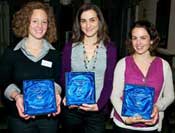Thursday 3 November 2011

First and third place for the ICR’s Alexandra Avgustinova, centre, and Holly Barker, right
Two up-and-coming ICR scientists have taken first and third prize in a Europe-wide cancer research competition.
PhD student Alexandra Avgustinova and postdoctoral scientist Dr Holly Barker have been honoured in the European Cancer Research Abstract Competition, which “recognises outstanding research of aspiring scientists”.
The competition, sponsored by AstraZeneca’s global biologics arm MedImmune, was open to graduate students and postdoctoral fellows across Europe with ten finalists shortlisted to present their research to an expert panel of judges. The three winners were announced at the awards ceremony on Tuesday night in Cambridge University’s Downing College following evaluation of their presentations on the basis of scientific merit, innovation and delivery.
The focus of the competition was the field of the tumour microenvironment* - the normal cells, molecules and blood vessels that surround solid cancers and play a role in their development.
Ms Avgustinova, from Professor Clare Isacke’s Molecular Cell Biology Team in the Breakthrough Breast Cancer Research Centre,** was awarded first prize of £2,000 for her research investigating the link between aggressive breast cancer and Cancer Associated Fibroblasts (CAFs) in the tumour microenvironment. A CAF is a type of connective tissue cell that is often recruited by aggressive tumours to support their growth.
“For any young scientist, the opportunity to share scientific work is extremely rewarding. Beyond that, having my work acclaimed by a panel of experts is a great honour indeed,” commented Alexandra Avgustinova. “Receiving this award fuels my hope and desire to see my research in practical application in the future. I would like to thank The Institute of Cancer Research for enabling me to conduct this research and MedImmune for the recognition.”
Dr Barker, from Dr Janine Erler’s Hypoxia and Metastasis Team in the ICR’s Division of Cancer Biology,*** was awarded the £500 third prize for her work investigating how an enzyme called LOXL2 remodels the breast tumour microenvironment to facilitate cancer spread.
“Being recognised by leading oncology experts has been an incredibly rewarding experience,” said Dr Barker. “Understanding how tumour cells modulate host cells in the local microenvironment to further support their own growth and drive tumour progression is fundamental for the development of cancer treatments in the future. I’m grateful to The Institute of Cancer Research for facilitating my research in this important area and MedImmune for giving me the opportunity to showcase it.”
One of the competition judges, Dr Thorsten Hagemann from Barts Cancer Institute, Queen Mary, University of London, said: “It is extremely encouraging to see the quality of scientific work being produced by these young scientists. Initiatives such as this competition are an essential part of our fight against cancer – highlighting new research, helping us to discover fresh scientific talent and new therapeutic solutions to human disease. Alexandra’s research is cutting edge science which will have an immediate impact on cancer treatment.”
-ENDS-
Media Contact: ICR Science Communications Manager Jane Bunce on 0207 153 5106 or after hours 077217 47900
Notes to editors:
* The focus of the competition – tumour microenvironments – reflects the research interests of MedImmune’s UK-based Oncology Department in Cambridge.
** Alexandra Avgustinova receives support from Breakthrough Breast Cancer and Cancer Research UK.
*** Holly Barker is funded by the Association for International Cancer Research (AICR)
The Institute of Cancer Research (ICR)
- The ICR is Europe’s leading cancer research centre
- The ICR has been ranked the UK’s top academic research centre, based on the results of the Higher Education Funding Council’s Research Assessment Exercise
- The ICR works closely with partner The Royal Marsden NHS Foundation Trust to ensure patients immediately benefit from new research. Together the two organisations form the largest comprehensive cancer centre in Europe
- The ICR has charitable status and relies on voluntary income
- As a college of the University of London, the ICR also provides postgraduate higher education of international distinction
- Over its 100-year history, the ICR’s achievements include identifying the potential link between smoking and lung cancer which was subsequently confirmed, discovering that DNA damage is the basic cause of cancer and isolating more cancer-related genes than any other organisation in the world
- The ICR is home to the world’s leading academic cancer drug development team. Several important anti-cancer drugs used worldwide were synthesised at the ICR and it has discovered an average of two preclinical candidates each year over the past five years.
- The Institute of Cancer Research’s Clinical Trials and Statistics Unit (ICR-CTSU) is an academic clinical trials unit accredited by the National Cancer Research Institute (NCRI) to conduct clinical trials into cancer treatments. The department is funded by an infrastructure grant from Cancer Research UK.
For more information visit www.icr.ac.uk